Judith Wermuth-Atkinson's Blog
August 3, 2017
CHANGING REALITY
Inspired by my readers
One of my readers asked me a fascinating and very thoughtful question on Goodreads. I loved it and, since it was sent anonymously, I posted it on my Facebook Author’s page (http://www.facebook.com/judith.wermut...). Then another reader and a friend of mine asked me a question related to my answer to the first anonymous question. I replied to my friend too, but the two questions inspired me to write a short blog, and I am very grateful to the two readers. The original question was this:
“If you could travel to any fictional book world, where would you go and what would you do there?”
For an instant I thought that for someone like me it would be difficult to offer an answer, since I have taught world literature for many years, and I have loved every single literary work I taught. I might have wanted to do many different things in the different worlds of the novel I have loved. However, one particular literary work came to mind almost immediately after I read the reader’s question. It was Cervantes’ novel Don Quixote. This work, the work of a real genius, consists of so many pages, and is so complex, that today it may be read mostly by specialists or in literature classes. I believe that over the years, its popular meaning has been reduced to a simplistic caricature—something that is very far from its profound philosophy.
What did I think I would want to do, if I could travel to the world of this novel? I thought that I would try to do what I have always wanted to do—work, together with Quixote, on encouraging readers, friends, literary characters, and anyone else, in understanding that reality is the crossing point between the subjective and the objective, between awareness and vision, and that the way we see the world is what matters most. Why? Because to achieve any change we first need to have a vision.
The American philosopher Dr. Wayne Dyer said: “If you change the way you look at things, the things you look at change.” It is what Don Quixote wanted to do—change the world into the dreams he had. Don’t we all want to do precisely that, and doesn’t our world deserve to be seen in a better way and changed accordingly, I asked my reader.
But then my friend on Facebook said that she often becomes desperate when she realizes how much suffering there is in our world, and how many are trying to destroy what others have built. This was a serious argument against my view of the meaning of Quixotic visions. Was I wrong, I asked myself. Is there no point in having dreams and in trying to superimpose them on what we think may be reality?
My answer remains the same. Dreams and visions are the way we build the future. Often, a lifetime is not enough to see the fruit of our effort to make dream come true, to turn vision into reality. As many characters in Cervantes’ novel see Don Quixote as an empty dreamer, or an insane visionary, we believe that reality is the opposite of dream and that it makes no sense to “fight windmills.” But going back to Dr. Dyer’s idea—we have to realize that it all depends what we see – the windmills or the giants. And what I see is that the result is not what matters most. This may be a shocking statement in the eyes of Western civilization. But to me, what matters most is the effort itself—the effort we put into reaching out for our dreams, into developing. It is the effort that brings motion, development, progress. This is not an original idea on my part. It was pointed out to me by my Meditation teacher Swami Veda Bharati. If we think carefully, humanity has moved forward in so many respects, despite the fact that at any given stage, people may not have thought that they have achieved their goals. Little by little, with each human being’s effort, we bring reality one step closer to our fellow-men and –women’s noble visions—and this subtle, quiet, almost esoteric development, is what nothing and no one can destroy.
CHANGING REALITY
CHANGING REALITY
Inspired by my readers
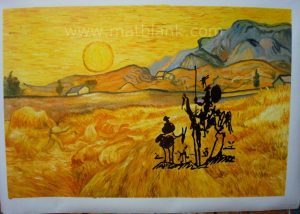
One of my readers asked me a fascinating and very thoughtful question on Goodreads. I loved it and, since it was sent anonymously, I posted it on my Facebook Author’s page (http://www.facebook.com/judith.wermut...). Then another reader and a friend of mine asked me a question related to my answer to the first anonymous question. I replied to my friend too, but the two questions inspired me to write a short blog, and I am very grateful to the two readers. The original question was this:
“If you could travel to any fictional book world, where would you go and what would you do there?”
For an instant I thought that for someone like me it would be difficult to offer an answer, since I have taught world literature for many years, and I have loved every single literary work I taught. I might have wanted to do many different things in the different worlds of the novel I have loved. However, one particular literary work came to mind almost immediately after I read the reader’s question. It was Cervantes’ novel Don Quixote. This work, the work of a real genius, consists of so many pages, and is so complex, that today it may be read mostly by specialists or in literature classes. I believe that over the years, its popular meaning has been reduced to a simplistic caricature—something that is very far from its profound philosophy.
What did I think I would want to do, if I could travel to the world of this novel? I thought that I would try to do what I have always wanted to do—work, together with Quixote, on encouraging readers, friends, literary characters, and anyone else, in understanding that reality is the crossing point between the subjective and the objective, between awareness and vision, and that the way we see the world is what matters most. Why? Because to achieve any change we first need to have a vision.
The American philosopher Dr. Wayne Dyer said: “If you change the way you look at things, the things you look at change.” It is what Don Quixote wanted to do—change the world into the dreams he had. Don’t we all want to do precisely that, and doesn’t our world deserve to be seen in a better way and changed accordingly, I asked my reader.

But then my friend on Facebook said that she often becomes desperate when she realizes how much suffering there is in our world, and how many are trying to destroy what others have built. This was a serious argument against my view of the meaning of Quixotic visions. Was I wrong, I asked myself. Is there no point in having dreams and in trying to superimpose them on what we think may be reality?
My answer remains the same. Dreams and visions are the way we build the future. Often, a lifetime is not enough to see the fruit of our effort to make dream come true, to turn vision into reality. As many characters in Cervantes’ novel see Don Quixote as an empty dreamer, or an insane visionary, we believe that reality is the opposite of dream and that it makes no sense to “fight windmills.” But going back to Dr. Dyer’s idea—we have to realize that it all depends what we see – the windmills or the giants. And what I see is that the result is not what matters most. This may be a shocking statement in the eyes of Western civilization. But to me, what matters most is the effort itself—the effort we put into reaching out for our dreams, into developing. It is the effort that brings motion, development, progress. This is not an original idea on my part. It was pointed out to me by my Meditation teacher Swami Veda Bharati. If we think carefully, humanity has moved forward in so many respects, despite the fact that at any given stage, people may not have thought that they have achieved their goals. Little by little, with each human being’s effort, we bring reality one step closer to our fellow-men and –women’s noble visions—and this subtle, quiet, almost esoteric development, is what nothing and no one can destroy.
June 3, 2017
“LOVE THY NEIGHBOR!” The importance of learning about different religions

Hindu fanatics armed against Muslims
Our civilization has an endless history of bloodshed in the name of what some believed was defending religious values—a history being created as painfully today as ever. Think of the medieval Christian Crusades, the Islamic conquest of Hispania (711-788), followed immediately by the Reconquista that ended only in 1492 with the fall of the last Islamic state at Granada, while the Ottoman empire was already practicing forceful conversion on the Balkans and the Europeans were to begin converting the indigenous population of the newly discovered continent. To all this we can add the continuous conflicts between Hindus and Muslims in Asia, the hopeless situation in the Middle East, Buddhism in Tibet regarded as an ideological and a political threat to communist China, and terrorism seen as a Holy War.
Some believe that all paths to God (a supreme being or the universal consciousness—whichever description we are comfortable with) are equally good and have the right to exist. I share that belief—with one qualification: as long as they lead to something constructive and not to something destructive. And here we already stumble over the fundamental problem. The moment we set a condition for accepting the belief of another we already reject it. The inherent human nature makes us feel stable, comfortable, and safe when we build our psyche and our lives upon the things we know. The unknown scares us. So what have people often done when they have encountered the unknown in history? They have tried to squeeze it into the mold of what they knew—to suit their own sense of safety and comfort. This quite simplistic described trait of human nature becomes enormously exaggerated and extremely important when it comes to religious (or anti-religious) beliefs, for they form the backbone of a person’s psyche, of a community’s life, of a culture, and frequently of law as well. When our inherent sense of feeling safe with what we know is transformed into an ideological belief—political or religious—we run the risk to believe that we are right. This belief is the foundation of the religious (and political) call for imposing one’s value system on another—the most harmful and most destructive phenomenon in the history of our civilization. Conversion, religious or other, could be one of the most beautiful inner spiritual processes an individual could experience. But forceful conversions are among the ugliest, most violent, and most inhuman ways people have treated people.
Does that mean that there is something wrong with sharing or with spreading religious beliefs?
Certainly not! What I see as profoundly wrong is the expectation that others believe precisely in what we believe and the sense that we need to force them into our shoes. The big question then is—how to create an environment in which the constructive predominates and the destructive is (almost) eliminated. In other words, how do we make sure that in the world we live in we find more compassion and cooperation than hate, conflict, and destruction? I suggest that the key in this task is understanding what understanding means.
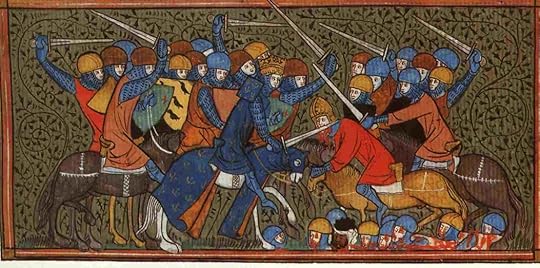
The Crusades
We cannot negotiate a peace agreement or a trade deal without understanding the other side. Nor can we have a happy marriage without understanding our partner. In order to stop fighting for existence and start coexisting peacefully and maybe happily, we have to start understanding each other better. Easy to say! Well … Can we understand anything we do not know? Knowing about something is the very first premise for understanding it. How much do we know about other cultures? About other religions? About another person? And how willing are we to leave our comfort zone of the known and to venture into exploring the unknown? We do not have to become converts in order to understand the views and beliefs of others. But there is one thing we cannot do without. There is a popular instruction in the Christian Gospel: “Love thy neighbor as thyself.” It sounds lovely, but there is a confusion I see here. What does love mean and who is our neighbor?

Gandhi and Nehru in a conversation
In the Western Greco-Christian tradition there are several words for love, each representing a different aspect. One of those aspects emphasizes the need of a human to make connection—to another human or to the divine. If we realize that we cannot pick and choose who the neighbor is but instead embrace the reality that our neighbor is everyone walking on this earth, and if we try to connect to our neighbors, to learn about them, then we will find that the beliefs we have in common are more than the beliefs that separate us from each other. Finding out about others and trying to understand them is a way that might lead to real, peaceful, and compassionate coexistence—rather than hate and destruction, amongst which we wave the flag of religious tolerance, without actually knowing much about the people and the ideas we want to tolerate.
DO WE NEED SPIRITUAL TEACHERS?
“If I have seen further, it is by standing on the shoulders of giants.” Isaac Newton
To teach means to assume one of the greatest responsibilities in this world – regardless whether one teaches a child, an adult, a student, a disciple, or a whole community. We all learn, at every step of the way, and we all teach someone something at times, though we do not always do it consciously. Of course, there are those who are teaching consciously, professionally–those who dedicate their lives to teaching. Those people take an enormous responsibility because of the inherent effects of teaching: If there is one to teach, most of the time there is someone to learn from her/him.
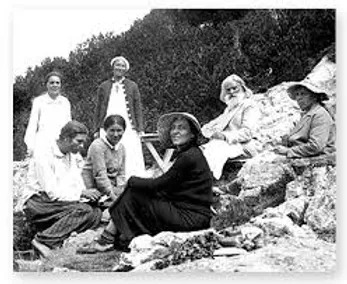
Beinsa Douno (The Master)
Throughout history priests, spiritual and political leaders, religious and academic institutions, time and again have abused the privilege of being listened to and the possibility of influencing the thoughts, feelings, and behavior of others. That has often brought about different kinds of danger. A person who cherishes freedom and independence of thought would resist the very idea of being influenced too much, of giving anyone the opportunity to shape her/his own thoughts. I myself resisted that idea when I decided to escape a communist regime and fled through several borders. The fact of the matter, however, is that our personalities are formed under diverse influences and that there are many people and things we have learned from. The danger of learning the wrong thing does not eliminate the fact that we do learn and that we are being taught—throughout life.
Friends and readers have asked me questions about why we need spiritual teachers, if we can walk a spiritual path on our own, and if there is some danger in following another’s views or philosophy of life. I have asked myself these questions too. I believe that there are many different roads that lead to spiritual development. From the vast pool of ideas and beliefs that every culture, every religion, and every scripture has, each one of us could select those ideas and beliefs that touch us personally and make us feel that we are on the path to something good, positive, compassionate, and constructive. Making such choices is what gives us the only means of control over our own mind – the choices what to learn and from whom. But we do learn and I think that a spiritual teacher is at least as useful and as necessary as a language or a piano teacher, or a tax accountant.
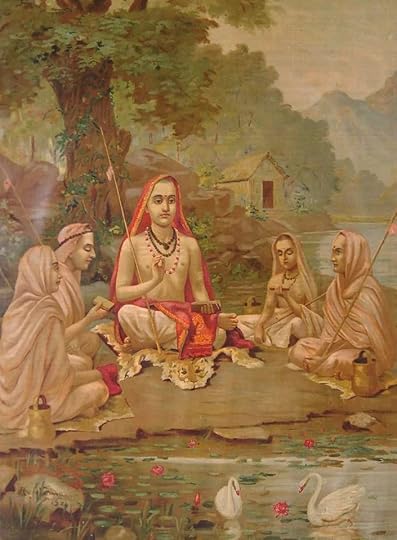 Shankaracharya
Shankaracharya
It is true that there are self-taught artists, musicians, or poets. I cannot pretend to know what the difference is between creative work and other abilities that involve the intellect. But I know that we cannot figure the laws of mathematics, geometry, or physics on our own. Do I compare spiritual development to this kind of knowledge? I certainly do, and I think that there is much more to learn when you are conscious of your spiritual development, for it requires us not only to acquaint ourselves with particular views or philosophical principles, but it also involves understanding psychology, behavior, health, and so much more–virtually every aspect of human life, not to mention aspects that connect us with universal phenomena.
Swami Veda Bharati
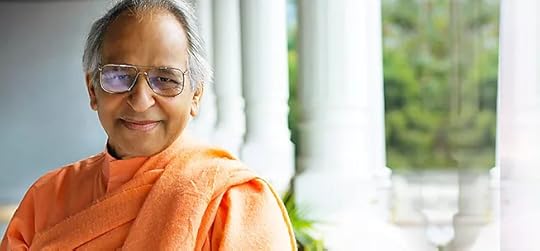 In my life I have both studied and taught, and I cannot escape my personal point of view. I spent many years promoting the idea that we have to study human thought of all times—ancient and modern, western and eastern. Underestimating spiritual development has never been an option for me as I have never underestimated any kind of education. If we want to work on our ability to live mindfully, spiritual development cannot be just a side track and if we take spiritual development seriously then we ought to learn from those who have more experience and more knowledge. Isaac Newton’s famous quote reveals a much deeper meaning in its original Latin formulation: “nani gigantum humeris insidentes” – dwarfs standing on the shoulders of giants, or discovering truth by building on previous discoveries. We do need to know what previous generations have thought, discovered, or created, and we do need those who know more about spiritual development than we do—for we want a world in which mindful living has as much value as economic development.
In my life I have both studied and taught, and I cannot escape my personal point of view. I spent many years promoting the idea that we have to study human thought of all times—ancient and modern, western and eastern. Underestimating spiritual development has never been an option for me as I have never underestimated any kind of education. If we want to work on our ability to live mindfully, spiritual development cannot be just a side track and if we take spiritual development seriously then we ought to learn from those who have more experience and more knowledge. Isaac Newton’s famous quote reveals a much deeper meaning in its original Latin formulation: “nani gigantum humeris insidentes” – dwarfs standing on the shoulders of giants, or discovering truth by building on previous discoveries. We do need to know what previous generations have thought, discovered, or created, and we do need those who know more about spiritual development than we do—for we want a world in which mindful living has as much value as economic development.

Some spiritual teachers live and work among us—literally for the common good. Think of Gandhi, for example. Before I met him, my teacher Swami Veda Bharati had traveled round the world—Africa, Latin America, the US, England— to study, write, and teach about migration, peace, and the state of minorities, and in 2003 he had given a talk at the UN on the topic of preventing terrorism. My friend Siddhartha Krishna lives in an ashram but he teaches Vedanta and yoga philosophy to people who come from all over the world and he is more concerned with social issues in contemporary India than with just about anything else. My spiritual teacher may live in a busy city or in a secluded monastery in the Himalayas, but what I learn from her/him (and I do not limit this to the concept of knowledge alone) I can take home— to my family, my work, my community, and, most of all, to any moment when I have to make a choice.
"LOVE THY NEIGHBOR!" The Importance of learning about different religions
Some believe that all paths to God (a supreme being or the universal consciousness—whichever description we are comfortable with) are equally good and have the right to exist. I share that belief—with one qualification: as long as they lead to something constructive and not to something destructive. And here we already stumble over the fundamental problem. The moment we set a condition for accepting the belief of another we already reject it. The inherent human nature makes us feel stable, comfortable, and safe when we build our psyche and our lives upon the things we know. The unknown scares us. So what have people often done when they have encountered the unknown in history? They have tried to squeeze it into the mold of what they knew—to suit their own sense of safety and comfort. This quite simplistic described trait of human nature becomes enormously exaggerated and extremely important when it comes to religious (or anti-religious) beliefs, for they form the backbone of a person’s psyche, of a community’s life, of a culture, and frequently of law as well. When our inherent sense of feeling safe with what we know is transformed into an ideological belief—political or religious—we run the risk to believe that we are right. This belief is the foundation of the religious (and political) call for imposing one’s value system on another—the most harmful and most destructive phenomenon in the history of our civilization. Conversion, religious or other, could be one of the most beautiful inner spiritual processes an individual could experience. But forceful conversions are among the ugliest, most violent, and most inhuman ways people have treated people.
Does that mean that there is something wrong with sharing or with spreading religious beliefs?
Certainly not! What I see as profoundly wrong is the expectation that others believe precisely in what we believe and the sense that we need to force them into our shoes. The big question then is—how to create an environment in which the constructive predominates and the destructive is (almost) eliminated. In other words, how do we make sure that in the world we live in we find more compassion and cooperation than hate, conflict, and destruction? I suggest that the key in this task is understanding what understanding means.
We cannot negotiate a peace agreement or a trade deal without understanding the other side. Nor can we have a happy marriage without understanding our partner. In order to stop fighting for existence and start coexisting peacefully and maybe happily, we have to start understanding each other better. Easy to say! Well … Can we understand anything we do not know? Knowing about something is the very first premise for understanding it. How much do we know about other cultures? About other religions? About another person? And how willing are we to leave our comfort zone of the known and to venture into exploring the unknown? We do not have to become converts in order to understand the views and beliefs of others. But there is one thing we cannot do without. There is a popular instruction in the Christian Gospel: “Love thy neighbor as thyself.” It sounds lovely, but there is a confusion I see here. What does love mean and who is our neighbor?
In the Western Greco-Christian tradition there are several words for love, each representing a different aspect. One of those aspects emphasizes the need of a human to make connection—to another human or to the divine. If we realize that we cannot pick and choose who the neighbor is but instead embrace the reality that our neighbor is everyone walking on this earth, and if we try to connect to our neighbors, to learn about them, then we will find that the beliefs we have in common are more than the beliefs that separate us from each other. Finding out about others and trying to understand them is a way that might lead to real, peaceful, and compassionate coexistence—rather than hate and destruction, amongst which we wave the flag of religious tolerance, without actually knowing much about the people and the ideas we want to tolerate.
Judith Wermuth-Atkinson
May 11, 2017
DO WE NEED SPIRITUAL TEACHERS?
Isaac Newton
To teach means to assume one of the greatest responsibilities in this world – regardless whether one teaches a child, an adult, a student, a disciple, or a whole community. We all learn, at every step of the way, and we all teach someone something at times, though we do not do it always consciously. Of course, there are those who are teaching consciously, professionally–those who dedicate their lives to teaching. Those people take an enormous responsibility because of the inherent effects of teaching: If there is one to teach, most of the time there is someone to learn from her/him.
Throughout history priests, spiritual and political leaders, religious and academic institutions, have abused time and again the privilege of being listened to and the possibility of influencing the thoughts, feelings, and behavior of others. That has often brought about different kinds of danger. A person who cherishes freedom
and independence of thought would resist the very idea of being influenced too much, of giving anyone the opportunity to shape her/his own thoughts. I myself resisted that idea when I decided to escape a communist regime and fled through several borders. The fact of the matter, however, is that our personalities are formed under diverse influences and that there are many people and things we have learned from. The danger of learning the wrong thing does not eliminate the fact that we do learn and that we are being taught—throughout life.
Friends and readers have asked me questions about why we need spiritual teachers, if we can walk a spiritual path on our own, and if there is some danger in following another’s views or philosophy of life. I have asked myself these questions too. I believe that there are many different roads that lead to spiritual development. From the vast pool of ideas and beliefs that every culture, every religion, and every scripture has, each one of us could select those ideas and beliefs that touch us personally and make us feel that we are on the path to something good, positive, compassionate, and constructive. Making such choices is what gives us the only means of control over our own mind – the choices what to learn and from whom. But we do learn and I think that a spiritual teacher is at least as useful and as necessary as a language or a piano teacher, or a tax accountant.
It is true that there are self-taught artists, musicians, or poets. I cannot pretend to know what the difference is between creative work and other abilities that involve the intellect. But I know that we cannot figure the laws of mathematics, geometry, or physics on our own. Do I compare spiritual development to this kind of knowledge? I certainly do, and I think that there is much more to learn when you are conscious of your spiritual development, for it requires us not only to acquaint ourselves with particular views or philosophical principles, but it also involves understanding psychology, behavior, health, and so much more–virtually every aspect of human life, not to mention aspects that connect us with universal phenomena.
In my life I have both studied and taught, and I cannot escape my personal point of view. I spent many years promoting the idea that we have to study human thought of all times—ancient and modern, western and eastern.
Underestimating spiritual development has never been an option for me as I have never underestimated any kind of education. If we want to work on our ability to live mindfully, spiritual development cannot be just a side track and if we take spiritual development seriously then we ought to learn from those who have more experience and more knowledge. Isaac Newton’s famous quote reveals a much deeper meaning in its original Latin formulation: “nani gigantum humeris insidentes” – dwarfs standing on the shoulders of giants, or discovering truth by building on previous discoveries. We do need to know what previous generations have thought, discovered, or created, and we do need those who know more about spiritual development than we do—for we want a world in which mindful living has as much value as economic development.
Some spiritual teachers live and work among us—literally for the common good. Think of Gandhi, for example. Before I met him, my teacher Swami Veda Bharati had traveled round the world—Africa, Latin America, the US, England— to study, write, and teach about migration, peace, and the state of minorities, and in 2003 he had given a talk at the UN on the topic of preventing terrorism. My friend Siddhartha Krishna lives in an ashram but he teaches Vedanta and yoga philosophy to people who come from all over the world and he is more concerned with social issues in contemporary India than with just about anything else. My spiritual teacher may live in a busy city or in a secluded monastery in the Himalayas, but what I learn from her/him (and I do not limit this to the concept of knowledge alone) I can take home— to my family, my work, my community, and, most of all, to any moment when I have to make a choice.
(You can find the original blog with images at www.judithwermuth.com)
Blue Poppies: A Spiritual Travelogue from the Himalaya
Judith Wermuth-Atkinson
April 27, 2017
Blue Poppies: WHY and HOW
“Choices are not only an expression of our freedom of will. Making choices is the way we form ourselves, the way we develop. By making choices, we create our views, dreams, and visions. We reinvent ourselves with each single choice we make.” (p.84)
Soon after Blue Poppies was published I received a questionnaire from the publisher that included a question about the main message of the book. In fact, I did not want to have the main message. Why did I then write this book?
My world is built upon the fundamental value of diversity—ethnic, religious, racial, cultural, etc.—and I see the need for understanding diversity in spiritual development too. There may be different messages in my book, and I hope that each one of you will find a message on a different page, in a different story. I wanted to write a book about my experience in the Himalaya in a way that will make you share that experience rather than just read about it. Thus, I did not want to offer any pre-digested message or anything that might sound like instruction. Instead, I offer images that could open a door to the world I describe, so that you can enter this world on your own and recreate it to match your personal search, your own ways of a spiritual or any other kind of development.
Thus, I did not want to offer any pre-digested message or anything that might sound like instruction. Instead, I offer images that could open a door to the world I describe, so that you can enter this world on your own and recreate it to match your personal search, your own ways of a spiritual or any other kind of development.
One of my main goals with this book was to de-mystify the concept of spirituality. This concept has been adopted by today’s society and many of you may know it intimately. Nevertheless, there is still a cloud of misunderstandings around this word. Spirituality, as I try to discuss it in Blue Poppies, belongs to daily life; it is part of a natural, human development—intellectual and psychological—it is not simply an attribute to some kind of privileged sages. Spiritual development, as I have learned in the Himalaya, is a development based on an ongoing awareness of the ways we choose to live— in other words, it is the development of mindful living.
So, if all that is true – then why do we need the Himalaya, the Vedas, or the teachers. Can we do without them?
I want to emphasize that there are many different paths to spiritual development. There are also many different spiritual communities, both in the and elsewhere in the world, which I did not write about in Blue Poppies. And, yes, we certainly could do without any of them. The question is … how?
elsewhere in the world, which I did not write about in Blue Poppies. And, yes, we certainly could do without any of them. The question is … how?
My vantage point is that of someone who has studied, taught, and researched the development of human thought and the connections and commonalities between different times, cultures, and religions (this has been the main topic of my literary research, of my philosophy classes, and of my classes on cultural studies). For many years my students have been asking me: Why study Plato? Why read Kant? There is a number of answers to those questions! In my personal view, good spiritual teachers are as useful and as necessary in the world as piano teachers, language teachers, or tax accountants—we just frequently do not see it this way. One reason for missing this point is that many cults, sects, and religious movements have done a lot of damage to the notion of spirituality and, thus, basically to civilization. I have been very fortunate to have been taught by teachers who were helpful, constructive, practical, and loving, and I have lived in spiritual communities that care deeply about society, equality, poverty, education, or the environment. I believe that choosing a teacher, as any other choice we make, requires mindfulness. I have not idealized India and I have not closed my eyes to the many of the issues Indian society has. But, as I say in the beginning of the book, “India is like the human mind: It has so many layers. … And on some of India’s many, many levels of existence, as I say toward the end of the book, there are hidden spiritual depth, wisdom, purity, and innocence….” And it is in our power to select from the vast pool of ideas and beliefs that every culture, every religion, and every scripture have, only those ideas and beliefs that touch us personally and that make us feel that we are on the path to something good, positive, compassionate, and constructive.
In the history of both ancient and modern India, there has been a lot of bloodsheds. Nevertheless, after 25 years of focusing on comparative religion and teaching religious philosophy in some of my classes, I realize that at heart the Hindu scriptures and the schools of thought based on them that developed over the centuries strongly promote open-mindedness, mindfulness, peace and tolerance—all things that we need to focus on in today’s world. I deeply believe that in the Himalaya, there are treasure troves of human thought – ancient and modern – that ought to be preserved and studied, for the sake of our search for a mindful living, but also for the sake of our civilization.
February 3, 2017
Welcome to My New Blog!
My name is Judith Wermuth-Atkinson, author of Blue Poppies. I welcome you as a visitor to my blog about my new book. This project is very special to me, and I hope to share some of that excitement with you here. I’ll be using this blog to interact with you about Blue Poppies, expanding on some of the topics in it and posting on some of the ideas related to my book. This is a great place for you to get to know me, and I’m looking forward to getting to know you, too. I would love to know what you thought about Blue Poppies or some of the ideas in it. How do you relate to my book? What questions do you have for me? I’ll be returning here frequently with new posts and responses to feedback from you. Please, tell me a little bit about yourself. Until next time…



